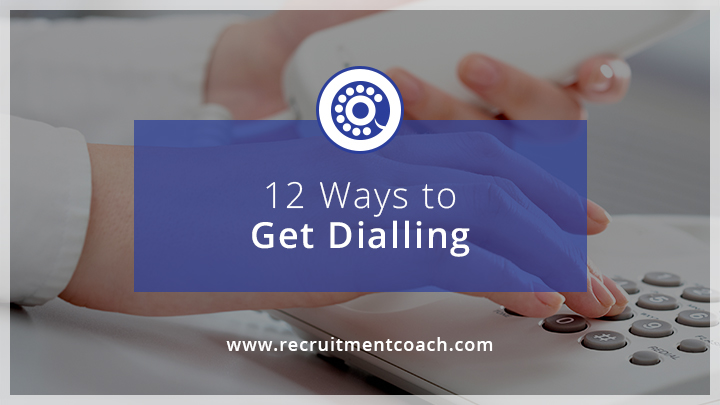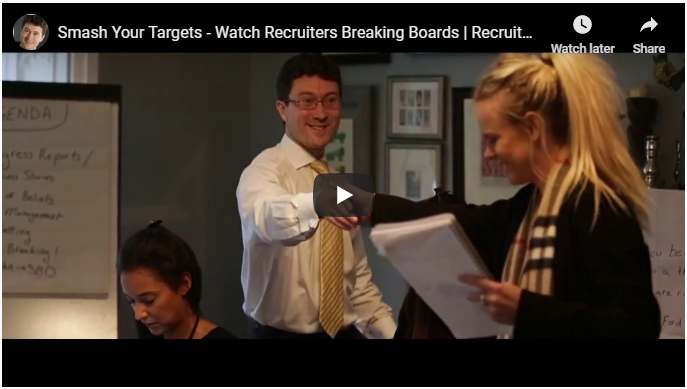 Let’s face it. Canvassing is the part of our job that most recruiters hate.
Let’s face it. Canvassing is the part of our job that most recruiters hate.
In fact, we’ll usually do almost anything to avoid it! And yet we all know that sales activity is critical to success in recruitment. So why do we tend to procrastinate when it comes to prospecting?
Although we don’t like to admit it, the main thing that holds us back is fear. Fear of failure. Fear of rejection. Fear of the unknown. The truth is that fear is a normal and healthy emotion. It’s good to be afraid in dangerous situations – it keeps us safe. However, sometimes we experience an exaggerated amount of fear that is inappropriate to the situation. Think about it – cold calling is not a life and death experience!
It’s OK to feel a bit nervous about making cold calls. Any athlete will tell you that adrenaline can help you to perform at your peak! Besides, courage is about taking action in spite of fear. The key to getting yourself to take action is to change the way you FEEL about picking up the phone.
In this series, we’ll cover fifteen tips to defeat call reluctance and get dialling!
1. Stop worrying about being perfect. We put so much pressure on ourselves to perform – no wonder we’re reluctant to pick up the phone. We’ve got performance anxiety! Take the pressure off yourself!
As Woody Allan said, “80% of success is just showing up.” Just by getting yourself to follow through and make your sales calls, you’re succeeded! If you mess up on the call, who cares? I’ve made over 10,000 sales calls and I still screw up sometimes. The most successful people are the ones who are willing to make mistakes. The only way you can not make mistakes is if you never take action – and that’s the path to ultimate failure.
2. Focus on finding the Ace of Spades. I want you to imagine that you have a list of 52 prospects to call. Now among those prospects, there are about 12 jacks, kings and queens – about 20% of them are people who are don’t currently have a need, but are good prospects to stay in touch with. Most of the prospects you call are cards you can discard. Either they’re unlikely to ever have a need, or they just won’t give you the time of day. Who cares?
There are probably about 4 aces – companies who have an immediate requirement you can help them with and who are willing to use your services. That’s only about 7.7% of the prospects in the deck, but if you keep looking they’re bound to turn up. And of the 4 aces, one of them – the ace of spades – is likely to become a repeat client who you really hit it off with and who gives you lots of business. Remember that you can’t expect to win business from everyone, and the fact is you don’t need to. All you need is a few people to say “yes” to make this process worthwhile.
3. Accept that most of the companies you call are not ready to buy from you … yet. That’s OK! The purpose of prospecting is not to close a sale, but to open a relationship. You’re building a database of warm prospects who might buy from you in the future. Write this down: “No now is not No forever.” The first call is like sowing a seed. If you keep nurturing the seeds you’ve planted, you’re going to reap the rewards come harvest time. And remember, you only ever have to make one cold call. Because the next time you phone them it will be a warm call.
4. Ask yourself, ‘What’s the worst that can happen?’ Shakespeare said “the coward dies a thousand deaths, the brave man dies but one.” Usually the thought of the thing we’re afraid of is much worse than the actual experience. Listen, what’s the worst that can happen? Let’s say you call them and they’re not interested. Who cares? There are plenty of other prospects out there.
What if they’re rude or offhand? Listen, if you’re polite and professional, most people will respond in kind. But hey, occasionally you will come across people who are just plain rude! Once in a blue moon, someone may even hang up on you– that’s happened to me before too! Can you handle that? Listen, you probably wouldn’t want their business anyway. Remind yourself that,“You can’t lose what you don’t already have.” You didn’t have their business before you made the call, you still don’t have their business, what have you lost? Absolutely nothing! You’re no worse off for having tried.
5. What would you be willing to attempt if you knew you could not fail? Among other things, you’d probably be a lot more enthusiastic about prospecting, wouldn’t you? Well I have good news for you: there is no such thing as failure, only feedback. Feedback is important. It lets you know if what you’re doing is working. And it helps you to improve so you get better results the next time. So there’s really no way you can fail – except to never try in the first place.
6. Decide to let every single call be a success. Huh? Well think about it. Who decides whether a call has been a success or not? You do, of course. So why not allow yourself to feel successful more often? Listen, people like doing things that make them feel good, and avoid things that make them feel bad. So make sure you feel good about canvassing.
Here’s how.
Make a list of primary and secondary objectives. Primary objectives are what you ‘ideally’ want from the call, for example to get a requirement or an appointment. Secondary objectives are the minimum you want to take away from the call. For example: to build rapport, to gather information, to raise your profile and get your name out there, to agree a date to call back, etc. Make your list of secondary objectives really long so that you’ll always achieve at least one of your secondary objectives. In fact, one of your secondary objectives might be to screen out any prospects who are not likely to give you business. That way every call is guaranteed to be a success, even if they hang up on you – because you’ve just qualified them out, and you’ll know not to waste time with them in future!
7. Make it almost impossible to feel rejected. You never have to experience rejection again. Listen, the best salespeople never get rejected. It’s not because their prospects never say no. They just don’t consider it rejection. After all, what is rejection? It’s not an experience, it’s your interpretation of that experience. What has to happen in order for YOU to feel rejected? People often tell me, “I feel rejected whenever someone responds negatively to me – for example if they are abrupt, off-hand, or disinterested.” Why not change your definition of rejection to make it a lot harder to feel rejected?
8. Decide not to take it personally. You can’t control what other how people behave towards you. You can only control how you interpret their behaviour and how you choose to respond. If a prospect is not receptive, don’t feel bad about it. What else could it mean? Maybe you’re just speaking to the wrong person. Maybe they genuinely don’t have a need. Maybe they’re just having a bad day! It could be any number of reasons, none of which have anything to do with you.
So how can you respond from now on when a call doesn’t go as well as you would have liked? Use the “Fonz technique.” Remember the Fonz from Happy Days? He was pretty unflappable and almost immune to criticism. What was his favourite expression? Ehhhhh!
The next time you have a bad call, or someone is harsh to you, as soon as you put the phone down give yourself the thumbs up and say,“Ehhhh!”
9. Pick up some momentum. According to Newton’s laws of physics,“a body at rest tends to stay at rest, and a body in motion tends to stay in motion.” The hardest part is getting started! So make the first call of the day an easy one. Call an exiting client or someone who has given you business in the past. Then while you’re feeling good from the first call, move straight into your new business calls. Don’t stop until you’ve made your target number of calls. It really works!
10. Remember that your best clients were once complete strangers. Before you begin your next canvassing session, spend a few moments reflecting on your best clients – the ones you have a really strong relationship with. Remember the first time you called them? How did it feel when they actually gave you an opportunity? How many placements have you made with them since? Ask yourself the question, “Which of the people on my prospect list will become my next best client?”
11. Ask yourself empowering questions. Want to know the secret to positive thinking? Asking yourself the right questions is a fast and easy way to put yourself in a positive frame of mind. For example:
- “What do I want to achieve?”
- “Which of these companies will give me a vacancy?”
- “How many people can I help today?”
- “How can I use this time as an opportunity to serve others?”
- “How can I get the best result, and enjoy the process?”
- “How many people can I make smile today?”
- “What am I going to spend the commission on?”
- “What reward will I give myself once I’ve made my sales calls?”
12. To overcome call reluctance, use the carrot & the stick! The carrot is pleasure and the stick is pain. As Tony Robbins says, “All human behaviour is motivated by two forces – our need to avoid pain and our desire to gain pleasure. This is a survival mechanism that is hardwired into our nervous system.”
If you ever procrastinate when it comes to prospecting, it’s because at some level you associate pain to making sales calls. No amount of willpower is going to change that. Instead of trying to force yourself to do something you don’t like, you need to change your psychology so that you WANT to pick up the phone. We need to change our neuro-associations (the things our brain links pain and pleasure to) so that we associate pleasure to making sales calls, and pain to NOT doing it. Make sense? Great. Now this isn’t something you can achieve just by reading passively. It’s going to require effort and your part. If you’re serious about maximising your sales performance, then please take 5-10 minutes to do the following exercise. It’s important to write down your answers because it will reinforce the new feelings you want to create.
I want you to ask yourself two very important questions…
a) What will it cost you if you fail to canvass consistently? Write a whole paragraph right now…
What will it cost you financially – in terms of missed opportunities and lost commissions? If you don’t make as much money as you’d like, how does that affect your standard of living? What about your financial security and your ability to provide for your family? What about the lack of freedom – in the form of having fewer choices? And if your finances are suffering, what will that do to your self-esteem? What effect will it have you on your relationships? What about your career prospects? How do they look when you’re not realising your full potential? Project yourself 5 years into the future, having failed to take action in this area. Where are you in your career compared to where you could be? When you look at yourself in the mirror, who do you see looking back at you? How do you feel about that?
Really put it on yourself. Do not hold back – let the emotion come out. The more strongly you can associate to these unpleasant feelings, the more powerful this exercise will be.
OK, you’ve done the hard part. If you’ve really gone for it and done this exercise to the best of your ability, you’re probably experiencing some pain right now. Pain can be good sometimes – it can drive us to new heights of success. Every time I do this exercise it has helped me to grow and become stronger. Hopefully we now have enough pain associated to not taking action. Let’s look at the flip side:
b) How will you benefit from canvassing on a consistent basis? What will you gain financially? How will that affect your sales figures, your commission, your earnings and therefore your standard of living? What will you have able to do, have, experience, contribute by improving your financial situation? What else will you gain? How about your level of job satisfaction? Or the sense of achievement? The acknowledgement and respect of your colleagues? What about the all new contacts you’ll make? Who knows what the effect of that will have on your ultimate destiny? The contacts you make now will repay you a thousand fold throughout your career! How will achieving in this area enable you to contribute to your family, your company, your community?
What other pleasure will you get – maybe it’s the buzz of winning a new vacancy, or the adrenaline rush of persuading another human being to your point of view? Maybe it’s the satisfaction of turning up to your next team meeting with tons of new vacancies to report. Or maybe it’s the satisfaction of making a call and really connecting with someone who ultimately becomes one of your best clients. Or maybe it’s the thrill of having contact with so many new people every day. What else will you gain – project yourself 5 years into the future. By virtue of having mastered this area, what else have you been able to accomplish? What other doors have opened to you? What people and opportunities have you attracted into your life? What’s been the impact on your self-esteem? How has the affected the quality of your relationships?
OK great job! If you’ve done this exercise properly, you’ve started stoking the flames of your desire. Now if you find that your motivation ever diminishes, you can come back to this exercise and do it again, and put even more emotion into it. The more emotion you put into it, the greater the intensity of desire you’ll experience!
The reality is that I can’t motivate you, nor can your boss, nor can anyone else. The only person who can motivate you is YOU. So here’s my challenge. Now that you’ve read my 12 tips for sales motivation, which of these ideas are you actually going to apply? Make a commitment to yourself right now. Choose 1-2 actions that make sense to you, and put them into practice immediately – as in today. In fact, why not start right now? Good luck!



